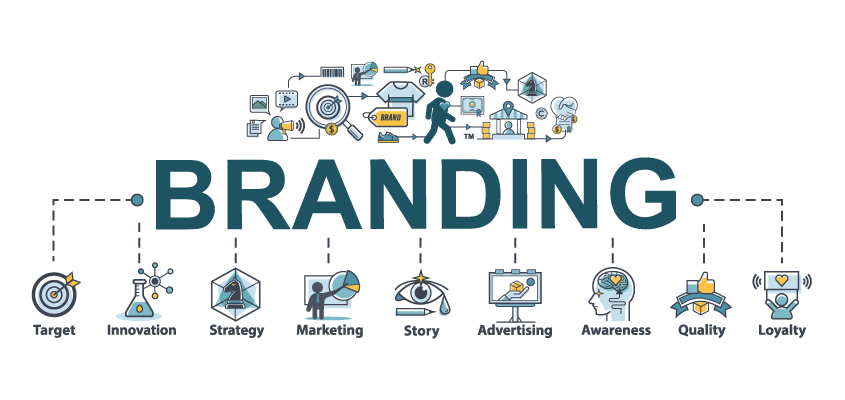The Secret to Structure Consumer Trust Fund Lies in Robust Branding
The Secret to Structure Consumer Trust Fund Lies in Robust Branding
Blog Article
Why Robust Branding Is Important for Market Leadership
A well-defined brand name identity not only sets a company apart from its competitors yet additionally grows depend on and emotional links with consumers. What are the certain methods that can elevate a brand name to this renowned condition?
Understanding Brand Name Identification
Constantly recognizing the importance of brand name identity is vital for any type of company desiring accomplish market management. Brand name identification encompasses the aesthetic components, messaging, and overall understanding that distinguish a business from its competitors. It functions as a foundation for exactly how consumers perceive and engage with a brand, playing an essential role fit their experiences and expectations.
A distinct brand name identification interacts the core worths and objective of an organization, developing a psychological link with its target audience. Components such as logo designs, color plans, typography, and intonation need to line up cohesively to share a consistent message across all platforms. This consistency enhances brand name acknowledgment and promotes customer commitment.
Furthermore, brand name identification is not simply shallow; it reflects the authenticity and stability of a firm. It should be carefully crafted to resonate with the desired target market while remaining versatile to evolving market fads. Organizations that prioritize a strong brand identification can properly distinguish themselves, build a favorable track record, and cultivate a faithful client base. Ultimately, a durable brand identity is important for browsing affordable landscapes and maintaining lasting success.
Structure Customer Count On
A solid brand identification prepares for constructing customer trust, a key part in attaining market management. Trust fund is not simply an emotional feedback; it is a tactical property that can significantly affect acquiring choices and brand name loyalty. Companies that grow openness, dependability, and consistency in their messaging and actions foster a feeling of security among consumers.
To develop this trust, brand names need to provide on their pledges. This suggests guaranteeing that item top quality satisfies consumer expectations which solution experiences are responsive and favorable. Moreover, constant communication strengthens reliability; when clients recognize what to anticipate which their problems will certainly be addressed, their self-confidence in the brand grows.
Social evidence likewise plays an important duty in developing trust. Positive testimonials, testimonies, and recommendations from trustworthy resources enhance a brand name's online reputation and can sway potential customers. Moreover, involving with clients through social platforms and resolving their problems openly shows liability and dedication.
Distinction in Open Markets
In today's jampacked marketplace, differentiation is important for brands seeking to attract attention and record consumer focus. With numerous choices offered, customers are commonly overwhelmed, making it critical for brand names to develop a special identification that reverberates with their target market. This distinction can materialize with numerous elements, consisting of item features, pricing strategies, customer support, and brand messaging.
Effective distinction includes not just recognizing what makes a brand name distinct but likewise interacting these distinctions clearly and regularly. Brands must verbalize their value suggestion in such a way see it here that addresses specific customer demands and choices. For instance, a company may concentrate on sustainability, innovative innovation, or personalized client experiences to take a specific niche in an affordable landscape.
Furthermore, brands must constantly evaluate their competitive setting to adapt and fine-tune their differentiation approaches. This positive technique makes sure that they remain appropriate and appealing to customers as market characteristics evolve. Eventually, robust branding that emphasizes differentiation not only fosters brand name commitment however also places a company as a leader in its market, paving the means for continual development and market supremacy.
Emotional Links With Consumers
Psychological connections work as a powerful stimulant in structure long-term connections between consumers and brands. It promotes commitment that goes beyond plain transactional communications when customers reverberate with a brand name on a psychological level. Brands that successfully evoke feelings-- whether via narration, shared values, or authentic involvement-- create a feeling of belonging for their clients.
These psychological connections can substantially influence buying choices, as consumers are often driven by sensations instead than logic. A brand name that aligns with link customers' ambitions or addresses their discomfort factors can cultivate a deep-seated loyalty that brings about repeat business and positive word-of-mouth references.
Additionally, emotional branding enables firms to distinguish themselves in crowded markets. By taking advantage of the beliefs of their target market, brands can take an one-of-a-kind identification that resonates deeply, making them remarkable and preferred over rivals.
In an age where consumers are pounded with choices, a strong emotional link can be the deciding consider brand name choice. Therefore, prioritizing emotional engagement is not merely a marketing tactic; it is a calculated important for brands seeking to develop meaningful connections and enhance consumer retention.
Long-Term Service Success
Sustainable company growth rests on the ability to grow robust branding approaches that reverberate with consumers in time. A strong brand name not only distinguishes a company from its rivals however also cultivates loyalty and count on amongst customers. This long-term relationship is crucial for ensuring repeat organization, which significantly adds to earnings stability and growth.
In a significantly competitive marketplace, brand names that interact a clear and consistent message are more most likely to grow. This uniformity websites strengthens brand identification, making it simpler for customers to recall and pick the brand over others. Robust Branding. As a result, a well-established brand name can adjust to market changes without losing its core significance, enabling innovation without alienating devoted clients
In addition, robust branding develops a platform for client engagement, wherein companies can collect responses and adapt their offerings as necessary. This repetitive procedure not just enhances client contentment however additionally builds a community around the brand name, promoting a sense of belonging.
Final Thought

Organizations that focus on a solid brand identity can effectively separate themselves, construct a favorable online reputation, and grow a dedicated consumer base.A strong brand identification lays the foundation for constructing client depend on, a vital part in attaining market management. A solid brand not only distinguishes a business from its competitors yet also cultivates commitment and depend on among clients. As a result, a well-established brand can adjust to market adjustments without shedding its core essence, permitting for innovation without alienating loyal clients.

Report this page